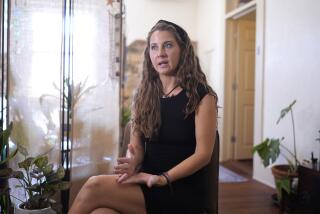Hospital’s Aid in Arrests Faces Court
- Share via
WASHINGTON — Again testing the frontiers in the war on drugs, the Supreme Court agreed Monday to decide whether public hospitals and police can work together to arrest pregnant women who have used cocaine.
South Carolina is the only state that charges mothers with child abuse if their babies are born with traces of illegal drugs in their blood.
To enforce the policy, nurses and doctors at a public hospital in Charleston, S.C., volunteered in 1989 to give police the names of women who tested positive for cocaine.
“Most of us assume there is a special confidentiality when you go to a doctor or a hospital. These women went to the hospital for medical care. Instead, they got arrested,” said Lynn Paltrow, a lawyer for the Women’s Law Project in Philadelphia, which sued on behalf of the women. The group accused the hospital and city prosecutors of conducting illegal searches in violation of the 4th Amendment.
Paltrow said the policy was directed almost entirely at poor, black women. Of 30 women who were arrested, 29 of them were African American, she said. The one white woman arrested gave birth to a mixed-race child--a fact that was noted by the nurses, she said.
In its defense, the hospital said it undertook the drug testing policy to combat the epidemic of so-called crack babies.
“This was a pathetic situation. These babies were being born exposed to cocaine. This was a medically driven policy to deal with a medical crisis,” said Robert H. Hood, a Charleston lawyer who represented the Medical University of South Carolina.
During the first year of the policy, women who tested positive were arrested and sometimes put in shackles immediately after giving birth. In later years, they were given the choice of drug treatment or arrest.
In 1993, after the lawsuit was filed, the hospital stopped turning over drug test results to police, but prosecutors maintain that the joint effort was legal. Last year, the U.S. 4th Circuit Court of Appeals agreed and threw out the women’s claim for damages.
Normally, police cannot search an individual for evidence unless they have a warrant and “probable cause” to believe a crime has been committed. The 4th Amendment has long been understood as forbidding mass searches and roundups by police.
But amid the war on drugs, that rule has been relaxed, or even discarded, some legal experts say. In 1989, the Supreme Court for the first time upheld the use of mass drug tests for special public employees, such as customs agents who carry guns.
Since then, broad-scale searches have been upheld by lower courts, and the requirement of “individualized suspicion” has faded.
But the Supreme Court may be ready to reconsider that trend in the term that begins in October.
Only last week, the justices announced that they will consider the constitutionality of “narcotics checkpoints.” City officials in Indianapolis set up these roadblocks and used drug-sniffing dogs to detect illegal drugs.
In the South Carolina case, the women’s lawyers said the “very integrity of the 4th Amendment” is at stake if the government can use routine medical tests as basis for bringing criminal charges.
A coalition of health care groups, including the California Medical Assn., also urged the court to hear the case (Ferguson vs. City of Charleston, 99-936).
“The trust inherent in the doctor-patient relationship was manipulated by law enforcement authorities to obtain bodily fluids from indigent pregnant women for use as incriminating evidence,” the medical groups said.
If such a policy is constitutional, they said, the privacy protection of the 4th Amendment will mean little.
More to Read
Sign up for Essential California
The most important California stories and recommendations in your inbox every morning.
You may occasionally receive promotional content from the Los Angeles Times.











